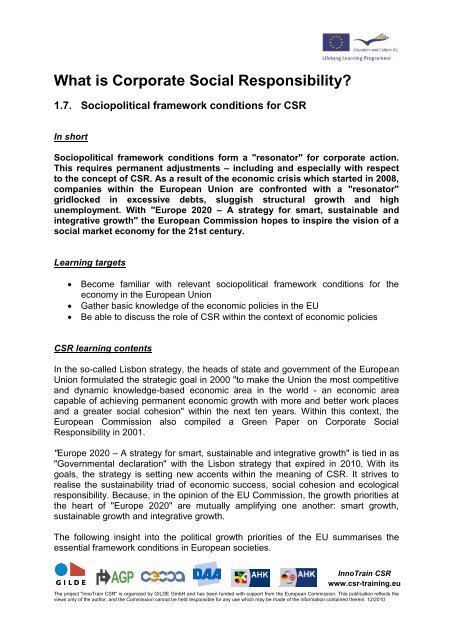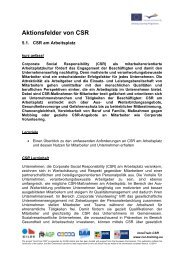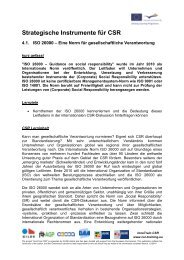What is Corporate Social Responsibility? - InnoTrain CSR
What is Corporate Social Responsibility? - InnoTrain CSR
What is Corporate Social Responsibility? - InnoTrain CSR
You also want an ePaper? Increase the reach of your titles
YUMPU automatically turns print PDFs into web optimized ePapers that Google loves.
<strong>What</strong> <strong>is</strong> <strong>Corporate</strong> <strong>Social</strong> <strong>Responsibility</strong>?<br />
1.7. Sociopolitical framework conditions for <strong>CSR</strong><br />
In short<br />
Sociopolitical framework conditions form a "resonator" for corporate action.<br />
Th<strong>is</strong> requires permanent adjustments – including and especially with respect<br />
to the concept of <strong>CSR</strong>. As a result of the economic cr<strong>is</strong><strong>is</strong> which started in 2008,<br />
companies within the European Union are confronted with a "resonator"<br />
gridlocked in excessive debts, slugg<strong>is</strong>h structural growth and high<br />
unemployment. With "Europe 2020 – A strategy for smart, sustainable and<br />
integrative growth" the European Comm<strong>is</strong>sion hopes to inspire the v<strong>is</strong>ion of a<br />
social market economy for the 21st century.<br />
Learning targets<br />
� Become familiar with relevant sociopolitical framework conditions for the<br />
economy in the European Union<br />
� Gather basic knowledge of the economic policies in the EU<br />
� Be able to d<strong>is</strong>cuss the role of <strong>CSR</strong> within the context of economic policies<br />
<strong>CSR</strong> learning contents<br />
In the so-called L<strong>is</strong>bon strategy, the heads of state and government of the European<br />
Union formulated the strategic goal in 2000 "to make the Union the most competitive<br />
and dynamic knowledge-based economic area in the world - an economic area<br />
capable of achieving permanent economic growth with more and better work places<br />
and a greater social cohesion" within the next ten years. Within th<strong>is</strong> context, the<br />
European Comm<strong>is</strong>sion also compiled a Green Paper on <strong>Corporate</strong> <strong>Social</strong><br />
<strong>Responsibility</strong> in 2001.<br />
"Europe 2020 – A strategy for smart, sustainable and integrative growth" <strong>is</strong> tied in as<br />
"Governmental declaration" with the L<strong>is</strong>bon strategy that expired in 2010. With its<br />
goals, the strategy <strong>is</strong> setting new accents within the meaning of <strong>CSR</strong>. It strives to<br />
real<strong>is</strong>e the sustainability triad of economic success, social cohesion and ecological<br />
responsibility. Because, in the opinion of the EU Comm<strong>is</strong>sion, the growth priorities at<br />
the heart of "Europe 2020" are mutually amplifying one another: smart growth,<br />
sustainable growth and integrative growth.<br />
The following insight into the political growth priorities of the EU summar<strong>is</strong>es the<br />
essential framework conditions in European societies.<br />
The project "<strong>InnoTrain</strong> <strong>CSR</strong>" <strong>is</strong> organized by GILDE GmbH and has been funded with support from the European Comm<strong>is</strong>sion. Th<strong>is</strong> publication reflects the<br />
views only of the author, and the Comm<strong>is</strong>sion cannot be held responsible for any use which may be made of the information contained therein. 12/2010<br />
,<br />
<strong>InnoTrain</strong> <strong>CSR</strong><br />
www.csr-training.eu





